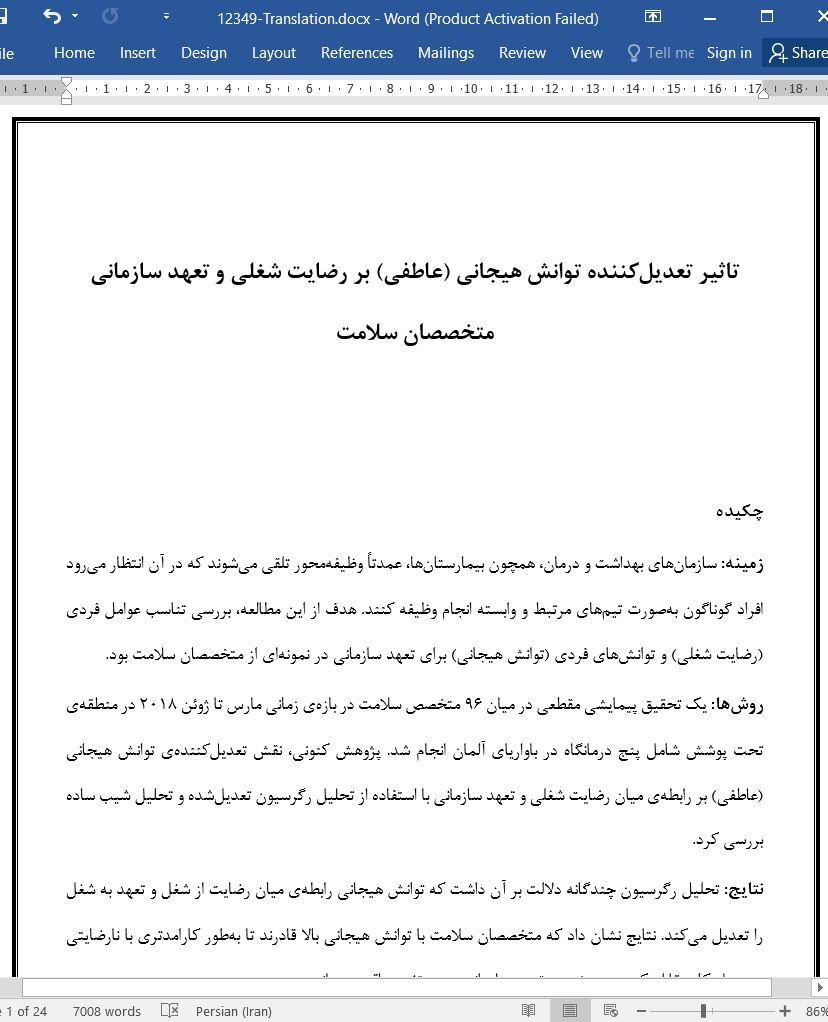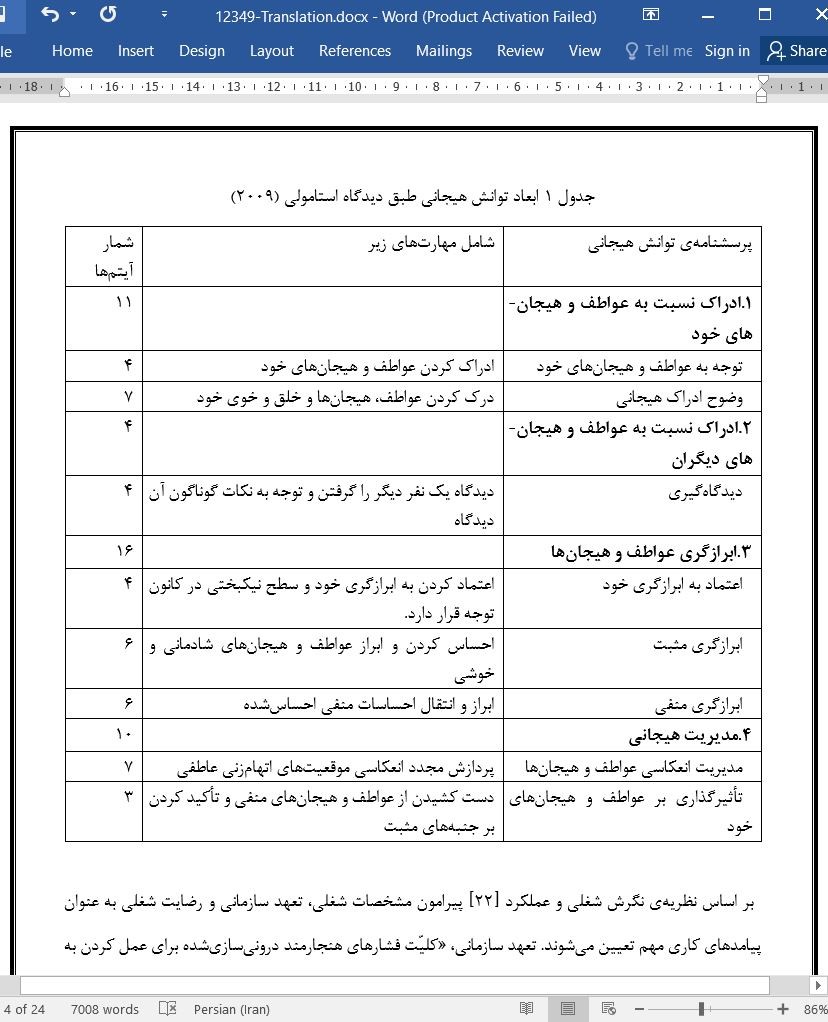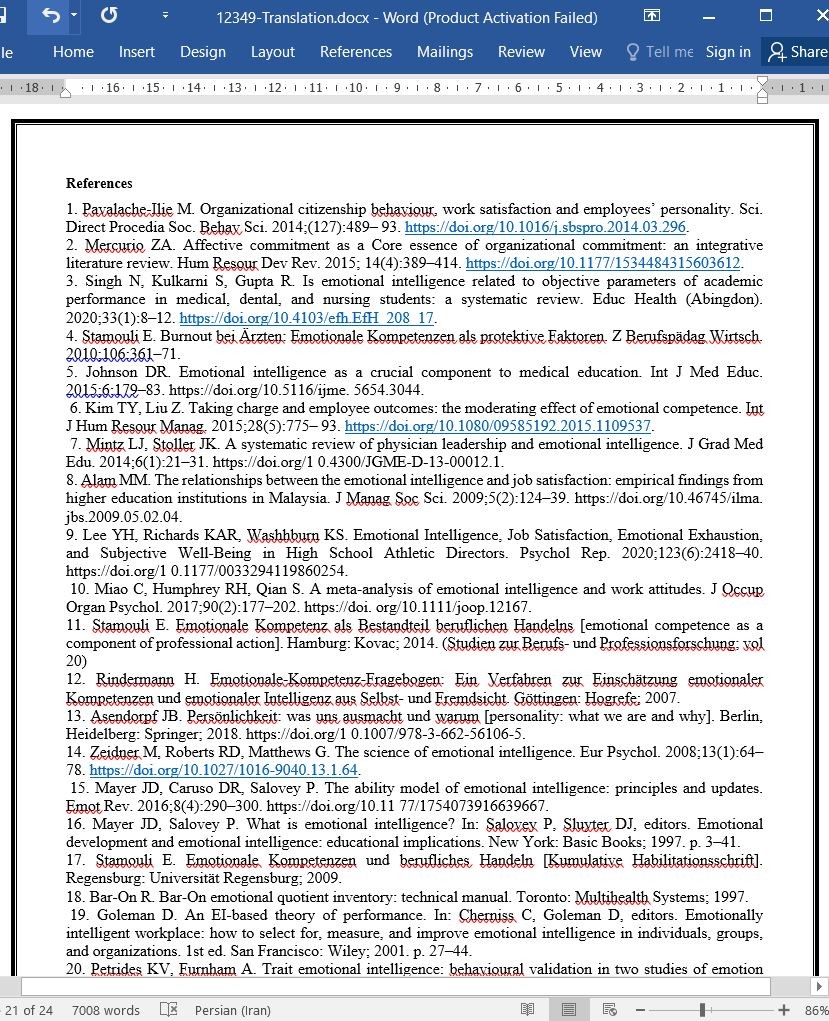
تاثیر تعدیل کننده توانش هیجانی (عاطفی) بر رضایت شغلی و تعهد سازمانی متخصصان سلامت
چکیده
زمینه: سازمان های بهداشت و درمان، همچون بیمارستان ها، عمدتاً وظیفه محور تلقی می شوند که در آن انتظار می رود افراد گوناگون به صورت تیم های مرتبط و وابسته انجام وظیفه کنند. هدف از این مطالعه، بررسی تناسب عوامل فردی (رضایت شغلی) و توانش های فردی (توانش هیجانی) برای تعهد سازمانی در نمونه ای از متخصصان سلامت بود.
روش ها: یک تحقیق پیمایشی مقطعی در میان 96 متخصص سلامت در بازه ی زمانی مارس تا ژوئن 2018 در منطقه ی تحت پوشش شامل پنج درمانگاه در باواریای آلمان انجام شد. پژوهش کنونی، نقش تعدیل کننده ی توانش هیجانی (عاطفی) بر رابطه ی میان رضایت شغلی و تعهد سازمانی با استفاده از تحلیل رگرسیون تعدیل شده و تحلیل شیب ساده بررسی کرد.
نتایج: تحلیل رگرسیون چندگانه دلالت بر آن داشت که توانش هیجانی رابطه ی میان رضایت از شغل و تعهد به شغل را تعدیل می کند. نتایج نشان داد که متخصصان سلامت با توانش هیجانی بالا قادرند تا به طور کارامدتری با نارضایتی در محل کار مقابله کنند و در نتیجه تعهد سازمانی بدون تغییر باقی می ماند.
نتیجه گری: بر پایه ی یافته های این مطالعه، توانش هیجانی متخصصان سلامت برای افزایش رضایت شغلی و تعهد به شغل مهم است. به ویژه برای متخصصان سلامتی که رضایت شغلی شان پایین است، سطح بالای توانش هیجانی آنان را قادر می سازد تا سطح بالایی از تعهد سازمانی را حفظ کنند. یافته های این مطالعه در سطح نظری برای پژوهشگران و در سطح عملی برای مدیران بیمارستانی که علاقه مند به ترویج توانش هیجانی و بهبود رضایت شغلی متخصصان سلامت و تعهد سازمانی شان هستند، مورد بحث قرار می گیرند، که این عوامل در نهایت ممکن است منجر به عملکرد کارامدی شوند.
زمینه
یافته های پژوهش های پیشین نشان داده است که کارمندان باکفایت، راضی، و متعهد در چندین حوزه به طور کارامدی اجرای وظیفه نمودند [3-1]. در میان دیگر توانش ها، علاقه ی فزاینده ای به درک نقش توانش هیجانی به عنوان توانش مهم دیگری در محل کار وجود دارد [5،4]. پژوهش های پیشین به اهمیت توانش هیجانی در نزد متخصصان سلامت به عنوان توانشی مهم پرداخته اند که به نظر می رسد واکنش های تطبیقی را در موقعیت هایی با بار عاطفی برمی انگیزد [7]. مرور نظام مند مینتز و استالر [7] این موضوع را مستند می کند که متخصصان سلامت باید قادر به تنظیم کردن هیجان های خود و هیجان های دیگران باشند. مطالعات پژوهشی بر اهمیت توانش هیجانی بر رضایت شغلی [1، 6، 10-8] یا بر تعهد سازمانی [1، 6، 10] تأکید کرده اند. هدف از مطالعه ی کنونی، بررسی تأثیر تعدیل-کننده ی توانش هیجانی بر رابطه ی میان رضایت شغلی و تعهد سازمانی است.
نتیجه گیری
افزون بر این، مدیران بیمارستان باید توانش هیجانی کارمندان را هنگام محول کردن وظایف و مشاغل که مستلزم تعهد سازمانی منطبق بر تناسب فرد-وظیفه یا فرد-شغل هستند را در نظر بگیرند، که این یک رویه ی منابع انسانی مهم است [73]. بر پایه ی شواهد تأییدشده در این مطالعه، می توان نتیجه گیری کرد که نمرات متخصصان سلامت در مورد توانش هیجانی معمولاً با نمرات آنان در مورد رضایت شغلی و تعهد سازمانی همبستگی دارد. این مطالعه یافته-های نایتینگل و همکاران [74] را اثبات می کند که توانش هیجانی بر متخصصان سلامت تأثیر می گذارد و مولفه ای حیاتی از آموزش پزشکی است [4، 5]. ما بهبود دوره ها و برنامه های آموزشی بهداشت و درمان را پیشنهاد می کنیم و برای این منظور باید به متخصصان سلامت کمک شود تا توانایی های هیجانی را به شیوه هایی بپرورانند که به آنان کمک کند تا بر نیازهای خود و نیز نیازهای بیماران شان تمرکز کنند. مطالعات دیگری لازم است تا مبنای شواهد در حال رشد پیرامون رابطه ی میان توانش هیجانی و دیگر متغیرهای مرتبط با کار در میان متخصصان سلامت را گسترش دهند. سرانجام، بررسی این موضوع که چگونه رضایت شغلی و توانش هیجانی به صورت مشترک بر پیامدهای متخصصان سلامت فراتر از تعهد سازمانی، ازجمله تعامل و اعتماد بیمار و نیز موفقیت حرفه، تأثیر می گذارند، نیز یک مسیر پژوهشی جالب خواهد بود.
Abstract
Background: Healthcare organisations, such as hospitals, are largely seen as task-oriented, width different people expected to work in interdependent teams. The objective of this study was to investigate the relevance of individual factors (job satisfaction) and individual competences (emotional competence) for organisational commitment in a sample of healthcare professionals.
Methods: A cross-sectional survey was conducted among 96 healthcare professionals from March to June 2018 in the catchment area of five clinics in Bavaria, Germany. The present research examined the moderating role of emotional competence on the relationship between job satisfaction and organisational commitment using moderated regression analysis and simple slope analysis.
Results: Multiple regression analysis indicated that emotional competence moderated the relationship between satisfaction with the job and commitment to the job. The results showed that healthcare professionals with high emotional competence are able to deal more effectively with dissatisfaction in the workplace so that organisational commitment remains unaffected.
Conclusions: Based on the findings of this study emotional competence of healthcare professionals is important for increasing job satisfaction and commitment to the job. Especially for healthcare professionals whose job satisfaction is low, a high level of emotional competence enables them to maintain a high level of organisational commitment. The findings of the study are discussed at the theoretical level for researchers and practical level for hospital managers interested in fostering emotional competence and improving healthcare professionals’ job satisfaction and their organisational commitment, which ultimately may lead to effective performance.
Background
Prior research findings showed that competent, satisfied and committed employees performed effectively in several domains [1–3]. Among other competences, there is an increasing interest to understand the role of emotional competence (EC) as another significant competence at the workplace [4, 5]. Previous research related to the importance of EC by health professionals as crucial competence which seems to promote adaptive reactions in emotionally charged situations [6]. Mintz and Stoller’s [7] systematic review documents that health professionals need to be able to regulate their own emotions and those of others. Research studies highlighted the impact of EC on job satisfaction [1, 6, 8– 10] or on organisational commitment [1, 6, 10]. The purpose of the current study is to investigate the moderating effect of EC on the relationship between job satisfaction and organisational commitment.
Conclusions
Moreover, hospital managers must consider the EC of employees when they assign jobs that require organisational commitment in accordance with person-job fit or person–task fit, which is an important human resource practice [73]. Drawing on the evidence established in this study, it can be concluded that healthcare professional’s scores on EC tend to be correlated with their scores on job satisfaction and organisational commitment. This study proves the Nightingale et al. [74] findings that EC has begun to influence healthcare professionals and is a crucial component of medical education [4, 5]. We suggest improving medical education training and programs by helping healthcare professionals to develop emotional abilities in ways that help them to focus on their needs as well as on patients’ needs. Further studies are required to expand the burgeoning evidence base on the relationship between EC and other work-related variables among healthcare professionals. Finally, examining how job satisfaction and EC jointly affect healthcare professional’s outcomes beyond organisational commitment, including patient interaction and trust as well as career success, is also an interesting research direction.
چکیده
زمینه
توانش هیجانی در بهداشت و درمان
روش ها
فرضیه ها
طراحی پژوهش
نمونه و راهبرد نمونه گیری
مقیاس ها
پرسشنامه تعهد سازمانی (OCQ)
مقیاس رضایت شغلی
پرسشنامه توانش هیجانی چندبعدی (MECQ)
رویه
تحلیل
نتایج
بحث
محدودیت های مطالعه
نتیجه گیری
منابع
Abstract
Background
Emotional competence in healthcar
Methods
Hypotheses
Research design
Sample and sampling strategy
Measures
Organizational commitment questionnaire (OCQ)
Job satisfaction scale
Multidimensional emotional competence questionnaire (MECQ
Procedure
Analysis
Results
Discussion
Study limitations
Conclusions
References
- اصل مقاله انگلیسی با فرمت ورد (word) با قابلیت ویرایش
- ترجمه فارسی مقاله با فرمت ورد (word) با قابلیت ویرایش، بدون آرم سایت ای ترجمه
- ترجمه فارسی مقاله با فرمت pdf، بدون آرم سایت ای ترجمه



